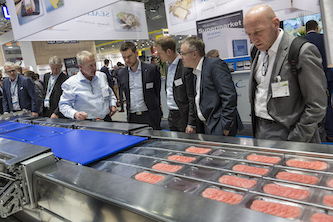Anuga FoodTec: Smart sensor technology in focus

From March 19 to 22, 2024, the leading providers of innovative and practical sensor solutions will once again be setting standards at Anuga FoodTec when it comes to successfully advancing process reliability and efficiency in food and beverage production. Powerful sensors will be presented at the Cologne exhibition center that take on many functions of cross-system communication - both from machine to machine and from machine to cloud.
Sensors are indispensable elements for automation. With fast response times and reliable and accurate measured values, they have been helping food producers optimize their processes for decades and thus save energy, time and media. But in the course of digitalization and networking, the tasks of measurement technology are also changing. “Just” measuring process parameters is no longer enough today. The more complex the automation scenario, the greater the requirements for sensor precision and reliability. The large amounts of data create new challenges when configuring and connecting measurement technology. Classic sensors that provide binary signals for control reach their limits here. They are increasingly being replaced by sensor systems in which, in addition to the actual measurement measurement recording, signal preparation and signal processing are also combined in one housing.
Smart automation starts with the sensor
At Anuga FoodTec, measurement technology providers, including Baumer, Endress+Hauser, ifm, Siemens, Vega, Optel and Beckhoff, will show how food producers can remain competitive with smart sensors even in the age of Industry 4.0. What all developments have in common is that digitalization is not being promoted as an end in itself, but rather has a practical background. Self-explanatory operating concepts, sensor diagnostics and options for wireless data exchange are considered key concepts for smart processes. In addition to high-resolution measurement technology, artificial intelligence and deep learning algorithms play an important role. The more intelligence is integrated into the sensor in the form of sophisticated signal processing, the more possibilities for self-monitoring and reconfiguration arise.
In the Cologne exhibition halls, this development is reflected in multi-sensor systems. They enable traditional technologies that are used to measure flow and level to record other material properties that are also relevant to quality. Examples of this are solutions based on the modulation of surface acoustic waves (SAW). With this measuring principle, the sensors work under completely hygienic conditions, i.e. without any fixed or movable components. There are no dead spaces, making cleaning easier. A special feature is that SAW sensors are suitable for measuring both static and rapidly changing conditions. In addition to flow, density and temperature, you can optionally record other values such as mass, density and Brix. The density factor can also be used to detect gas bubbles and particles in liquids. The technology makes it possible, for example, to determine the original wort content during the ongoing brewing process. This means that quality control is no longer carried out randomly in the laboratory, but rather directly and in real time - an option that beverage manufacturers did not have before.
Data brought to the cloud
At the same time, communication standards such as OPC UA are also becoming established in the food industry. This makes it possible to communicate data through and into all automation levels – right up to the cloud. Once there, you can evaluate them as you wish. For example, in addition to the process value, the oscillation frequency of the pipe or the temperature of the electronics can be read from a Coriolis flowmeter. In addition to monitoring the current status of the measuring device, this data can also be used for predictive maintenance. The sensors can send the diagnostic codes to a condition monitoring system with the aim of initiating a timely check of the sensor before it no longer provides data. This reduces the number of system downtimes and process interruptions.
The field devices communicate with the cloud using gateways and edge devices on a second channel parallel to the control circuit. In order to be able to operate both communication levels simultaneously and independently of each other, the required interfaces are already implemented in the hardware in Industry 4.0-capable sensors. Many measuring points in existing systems can also be retrofitted with wireless interfaces such as WirelessHart, WLAN or Bluetooth. Another advantage of the latest generation of sensors is the integrated web server. This not only meets modern cybersecurity requirements, but also enables simple and convenient commissioning using mobile devices. The entire configuration and diagnosis takes place via a standard web browser, no in-depth knowledge of PLC programming is required.
Industry 4.0 expertise for the entire industry
On site at Anuga FoodTec, visitors can see for themselves how easy and time-saving current automation tasks can be solved with smart sensors. From March 19 to 22, 2024, the technology providers will present a complete portfolio of hygienic flow, level, temperature, pressure and other analysis sensors that are specifically designed to meet the requirements of the food and beverage industry. They allow a look into what is happening in the process and provide system operators with important diagnostic and process data. The offering ranges from sensors and connectivity components to online services and apps for various diagnostic tasks. Food producers who are already well advanced with their implementation in the sense of Industry 4.0 and are considering direct communication to a cloud solution or another higher-level system will also find future-proof solutions in Cologne.
Anuga FoodTec is the leading international supplier trade fair for the food and beverage industry. Organized by Koelnmesse, the trade fair will take place in Cologne from March 19th to 22nd, 2024 and focuses on the key theme of responsibility. The technical and intellectual sponsor is the DLG, German Agricultural Society.
Further information: www.anugafoodtec.de
